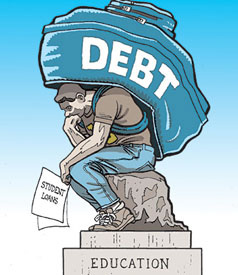
|  |  |  Editorials | Opinions | December 2008 Editorials | Opinions | December 2008  
Protect Student Loan Borrowers, Not Just Lenders
 Danny K. Davis & Yvette D. Clarke - t r u t h o u t Danny K. Davis & Yvette D. Clarke - t r u t h o u t
go to original


| | (Matson/St. Louis Post-Dispatch) |  |
As members of Congress who are active in education policy, we write to strongly urge the Treasury and Federal Reserve to include consumer protections in their plan to use taxpayer dollars to buy student loan securities. We strongly support ensuring that students have the money they need to attend institutions of higher education. However, we must make certain that any such plan aids students and doesn't simply line the pockets of for-profit lenders.

Most students and families use federal loans to pay for college. Thanks to recent actions by Congress and the Department of Education, federal student loans are readily available. However, certain groups of students require private student loans to attend school, such as students who need to borrow more than is available federally, students who attend schools that do not participate in the federal loan program, and international students. The Project on Student Debt estimates that only about 8 percent of undergraduates used private loans last year. Unlike federal student loans, private student loans typically lack any form of consumer protection (e.g., fixed interest rates, income-contingent and income-based repayment options, and debt discharge in the case of disability or death). For these reasons, lenders and financial aid experts generally agree that students should exhaust federal financial aid prior to using private loans.

Although the Treasury recently released some details about the new Term Asset-Backed Securities Loan Facility, the nature of the program related to student loans remains unclear. We have serious concerns about using taxpayer money to subsidize for-profit lenders of non-federal student loans. A number of higher education groups representing students, consumers and colleges share our concerns. The Treasury-Fed plan seems to equate credit card, auto and student loans. However, these debts are not equal. Private student loan lenders enjoy federal protections from bankruptcy that other consumer creditors do not. Specifically, unlike other types of consumer debt, private student loans are protected from discharge during bankruptcy except under extreme circumstances. Thus, an individual who accumulates thousands of dollars in debt for purchases of cars or luxury goods can obtain relief via bankruptcy; however, a teacher with private student loans cannot.

Given these circumstances, we hope the Treasury and Federal Reserve will construct their student loan plan carefully to mitigate against adverse consequences for private student loan borrowers, especially in light of current economic conditions. Should taxpayer money be used to support private student lenders of non-federal loans, we strongly urge that the Treasury and Federal Reserve require consumer protections similar to those afforded to federal student loans as a condition of receipt of federal rescue funds. Federal student loans have consumer protections; private student loans subsidized by the Treasury-Fed plan should have such protections as well. Further, we recommend instituting steps to assess the underwriting standards of lenders who seek federal relief to determine if the lenders extended credit to particularly vulnerable consumers and whether credit was extended with onerous terms or conditions. Similar to the executive compensation restrictions of the Treasury-Fed plan, these restrictions would help focus federal dollars on stimulating lending while protecting taxpayers and borrowers.

We commend the effort to ensure that students with financial needs can access higher education during this economic crisis. We urge the Treasury and Federal Reserve to proceed cautiously when using taxpayer funds for the student loan industry, ensuring that both financial and consumer protections are considered.

Rep. Danny K. Davis represents the 7th Congressional District of Illinois and Rep. Yvette D. Clarke represents the 11th Congressional District of New York. |

 |
|  |



